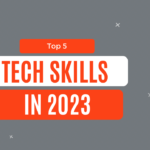Introduction:
In the fast-paced world of technology, staying relevant and competitive means constantly upgrading your skill set. Whether you’re a seasoned IT professional or just starting your tech journey, knowing which skills are currently in high demand is crucial. In this blog post, we’ll explore the top five tech skills that can help you thrive in today’s ever-evolving tech landscape.
1. Programming and Software Development

Programming has always been at the core of the tech industry, and it’s not going anywhere. Proficiency in programming languages like Python, Java, JavaScript, and C++ is invaluable. However, it’s not just about knowing a language; it’s about understanding how to use it effectively. With the rise of web and mobile app development, expertise in frameworks such as React, Angular, and Vue.js is also highly sought after. Being able to build scalable and maintainable software is a skill that will never go out of style.n the ever-evolving landscape of technology, one skill remains the cornerstone of innovation and progress: programming and software development. Mastery of programming languages like Python, Java, JavaScript, and C++ is akin to possessing the keys to the digital kingdom. But it’s not merely about knowing the syntax; it’s about crafting elegant solutions to complex problems, designing intuitive user interfaces, and building robust, scalable software systems.
Today, the demand for software developers is insatiable. With the proliferation of web and mobile applications, the ability to work with frameworks such as React, Angular, and Vue.js is highly coveted. These frameworks enable developers to create dynamic, responsive, and user-friendly applications that cater to the modern digital experience.
What sets a proficient software developer apart is not just the ability to write code but also the skill to collaborate, adapt to new technologies, and tackle challenges creatively. Continuous learning and keeping pace with evolving development methodologies and tools are essential.
From startups to tech giants, every organization relies on skilled developers to bring their digital visions to life. Whether it’s crafting the next viral mobile app or building the backbone of a cloud-based service, software development is at the heart of technological innovation. It’s a skill that empowers individuals to turn ideas into reality, shaping the future one line of code at a time. In a world driven by digital transformation, programming and software development remain the quintessential skills for those who seek to make an impact in the tech industry.
2. Data Science and Machine Learning

Data is often referred to as the new oil, and for a good reason. Data science and machine learning skills are in high demand across various industries. Companies are harnessing the power of data to gain insights, make data-driven decisions, and build predictive models. Familiarity with data analysis tools like Pandas and data visualization libraries like Matplotlib is crucial. Additionally, knowledge of machine learning libraries such as TensorFlow and PyTorch can open up doors to exciting career opportunities in AI and data science.In the data-driven era, the demand for data scientists and machine learning experts has surged, making it one of the most coveted tech skills of our time. Data science is the art of extracting meaningful insights from vast and complex datasets, while machine learning involves teaching computers to learn from data and make predictions or decisions. These skills have applications across industries, from healthcare and finance to e-commerce and entertainment.
Data science professionals are proficient in data analysis, statistical modeling, and data visualization. They utilize tools like Pandas, Matplotlib, and Jupyter to explore data and communicate their findings effectively. Data engineers help prepare and maintain data pipelines, ensuring that data is clean, accessible, and ready for analysis.
Machine learning, on the other hand, focuses on creating predictive models and intelligent systems. Professionals in this field work with libraries like TensorFlow and PyTorch to build and train machine learning models. They develop algorithms that power recommendation systems, image recognition software, autonomous vehicles, and more.
The impact of data science and machine learning is pervasive. In healthcare, these skills are used to predict disease outbreaks and personalize treatments. In finance, they assist in fraud detection and algorithmic trading. In e-commerce, they drive product recommendations and optimize supply chains.
As the volume of data continues to grow exponentially, the demand for individuals who can harness this data for meaningful insights and predictive power will only increase. A career in data science and machine learning not only offers excellent job prospects but also the opportunity to contribute to advancements that shape our future. It’s a dynamic field where curiosity and creativity are as important as technical proficiency, making it an exciting and rewarding choice for tech enthusiasts.
3. Cloud Computing

The cloud has revolutionized the way businesses operate and deliver services. Leading cloud platforms like Amazon Web Services (AWS), Microsoft Azure, and Google Cloud Platform (GCP) dominate the industry. Proficiency in cloud services, infrastructure as code (IaC) tools like AWS CloudFormation and Terraform, and cloud architecture is essential. As more organizations migrate to the cloud, cloud expertise is a skill that will continue to be in high demand.In today’s digital landscape, cloud computing has emerged as a transformative force, revolutionizing the way businesses operate and deliver services. As a top tech skill, proficiency in cloud computing is indispensable for IT professionals and organizations seeking to optimize scalability, flexibility, and cost-efficiency.
Leading cloud platforms such as Amazon Web Services (AWS), Microsoft Azure, and Google Cloud Platform (GCP) have become the backbone of modern computing. Cloud computing allows businesses to access a vast array of services, including computing power, storage, databases, machine learning, and more, on a pay-as-you-go basis. This flexibility enables companies to scale their resources up or down as needed, reducing the need for expensive on-premises infrastructure.
Professionals skilled in cloud computing can architect and manage cloud environments, ensuring they are secure, reliable, and cost-effective. They leverage tools like AWS CloudFormation and Terraform for infrastructure as code (IaC) to automate deployment and management processes, saving time and reducing human error.
Cloud architects design cloud solutions tailored to meet the specific needs of organizations, from startups to enterprises. They optimize resource utilization and implement robust security measures to protect data and applications from cyber threats. Cloud administrators monitor and maintain cloud environments, ensuring they run smoothly and efficiently.
The relevance of cloud computing is growing as more organizations embark on their digital transformation journeys. The ability to harness the power of the cloud has become a critical competitive advantage. Whether it’s migrating legacy systems to the cloud, building cloud-native applications, or managing hybrid cloud environments, cloud computing skills are in high demand, making it a must-have skill for tech professionals looking to thrive in the digital age.
4. Cybersecurity

With the increasing frequency and sophistication of cyberattacks, cybersecurity has never been more critical. Organizations are looking for experts who can protect their digital assets and data. Cybersecurity skills encompass a wide range of knowledge, including network security, ethical hacking, threat detection, and security best practices. A strong cybersecurity skill set can help you safeguard both your career and the organizations you work for.In an increasingly interconnected and digital world, cybersecurity stands as a guardian of the digital realm, making it one of the paramount tech skills of our time. The rise of cyber threats and attacks has catapulted the demand for cybersecurity experts to protect sensitive data, critical infrastructure, and the very foundations of our digital lives.
Cybersecurity is a multifaceted domain encompassing various roles and responsibilities. Ethical hackers, also known as penetration testers, use their skills to probe and identify vulnerabilities in systems, networks, and applications before malicious hackers can exploit them. Security analysts monitor networks for suspicious activities, detect breaches, and respond to incidents to mitigate damage.
Additionally, there are security architects who design robust security infrastructures, ensuring that data is safeguarded with layers of defenses. Cybersecurity specialists in risk management assess and quantify potential threats, helping organizations make informed decisions about security investments and strategies.
The arsenal of cybersecurity professionals includes knowledge of firewalls, intrusion detection systems, encryption, antivirus software, and more. Keeping up with the evolving threat landscape is a constant endeavor, making continuous learning a fundamental aspect of the role.
As businesses increasingly rely on digital technologies, the role of cybersecurity experts has never been more critical. Breaches can result in financial losses, reputational damage, and legal consequences. Consequently, organizations are investing heavily in cybersecurity measures, creating a thriving job market for those with the right expertise.
A career in cybersecurity not only offers job security but also the satisfaction of safeguarding critical systems and data from cyber threats. It’s a field that demands constant vigilance, adaptability, and ethical responsibility, making it a challenging and rewarding choice for tech professionals dedicated to preserving the integrity of the digital world.
5. Artificial Intelligence (AI) and Natural Language Processing (NLP)

AI and NLP are changing the way we interact with technology and data. From chatbots to language processing applications, these technologies have applications in various industries. Building AI models, understanding neural networks, and working with NLP libraries like NLTK and spaCy are valuable skills. As AI continues to advance, professionals with expertise in this field will be at the forefront In the ever-evolving technological landscape, the domains of Artificial Intelligence (AI) and Natural Language Processing (NLP) have emerged as frontiers of innovation and are among the top tech skills sought after by organizations worldwide. These fields are driving transformative changes across industries, from healthcare and finance to customer service and entertainment.
AI is the science of creating intelligent agents capable of learning, reasoning, and making decisions, often mimicking human cognitive functions. NLP, a subfield of AI, focuses on enabling machines to understand, interpret, and generate human language. Together, AI and NLP empower the development of smart applications and systems that can comprehend and interact with users in natural language, opening up a realm of possibilities.
Professionals in AI and NLP work on a wide range of projects, including chatbots that provide customer support, language translation services, and voice assistants like Siri and Alexa. They also delve into more complex areas, such as autonomous vehicles, healthcare diagnostics, and sentiment analysis for market research.
To excel in AI and NLP, individuals must possess a deep understanding of machine learning algorithms, neural networks, and data preprocessing techniques. Additionally, they need proficiency in programming languages like Python, which offers an extensive ecosystem of libraries and frameworks, such as TensorFlow and spaCy, specifically designed for AI and NLP tasks.
The demand for AI and NLP expertise is steadily increasing as organizations recognize the potential for automation, efficiency improvements, and enhanced user experiences. Innovations like self-driving cars, personalized healthcare, and intelligent virtual assistants are driving this demand and offering exciting opportunities for those skilled in these domains.
A career in AI and NLP not only promises job security but also the chance to be at the forefront of technological advancements that have the potential to reshape industries and improve the quality of life for people around the world. It’s a field that rewards creativity, problem-solving, and a passion for pushing the boundaries of what machines can achieve.
Conclusion:
In the rapidly evolving tech industry, staying up-to-date with the latest trends and acquiring new skills is essential. These top five tech skills – programming, data science, cloud computing, cybersecurity, and AI/NLP – are not only in demand today but are also likely to remain relevant in the years to come. By mastering these skills, you can position yourself as a valuable asset in the ever-expanding world of technology.
FAQ
Introduction:
In the fast-paced world of technology, staying relevant and competitive means constantly upgrading your skill set. Whether you’re a seasoned IT professional or just starting your tech journey, knowing which skills are currently in high demand is crucial. In this blog post, we’ll explore the top five tech skills that can help you thrive in today’s ever-evolving tech landscape.
1. Programming and Software Development
Programming has always been at the core of the tech industry, and it’s not going anywhere. Proficiency in programming languages like Python, Java, JavaScript, and C++ is invaluable. However, it’s not just about knowing a language; it’s about understanding how to use it effectively. With the rise of web and mobile app development, expertise in frameworks such as React, Angular, and Vue.js is also highly sought after. Being able to build scalable and maintainable software is a skill that will never go out of style.n the ever-evolving landscape of technology, one skill remains the cornerstone of innovation and progress: programming and software development. Mastery of programming languages like Python, Java, JavaScript, and C++ is akin to possessing the keys to the digital kingdom. But it’s not merely about knowing the syntax; it’s about crafting elegant solutions to complex problems, designing intuitive user interfaces, and building robust, scalable software systems.
Today, the demand for software developers is insatiable. With the proliferation of web and mobile applications, the ability to work with frameworks such as React, Angular, and Vue.js is highly coveted. These frameworks enable developers to create dynamic, responsive, and user-friendly applications that cater to the modern digital experience.
What sets a proficient software developer apart is not just the ability to write code but also the skill to collaborate, adapt to new technologies, and tackle challenges creatively. Continuous learning and keeping pace with evolving development methodologies and tools are essential.
From startups to tech giants, every organization relies on skilled developers to bring their digital visions to life. Whether it’s crafting the next viral mobile app or building the backbone of a cloud-based service, software development is at the heart of technological innovation. It’s a skill that empowers individuals to turn ideas into reality, shaping the future one line of code at a time. In a world driven by digital transformation, programming and software development remain the quintessential skills for those who seek to make an impact in the tech industry.
2. Data Science and Machine Learning
Data is often referred to as the new oil, and for a good reason. Data science and machine learning skills are in high demand across various industries. Companies are harnessing the power of data to gain insights, make data-driven decisions, and build predictive models. Familiarity with data analysis tools like Pandas and data visualization libraries like Matplotlib is crucial. Additionally, knowledge of machine learning libraries such as TensorFlow and PyTorch can open up doors to exciting career opportunities in AI and data science.In the data-driven era, the demand for data scientists and machine learning experts has surged, making it one of the most coveted tech skills of our time. Data science is the art of extracting meaningful insights from vast and complex datasets, while machine learning involves teaching computers to learn from data and make predictions or decisions. These skills have applications across industries, from healthcare and finance to e-commerce and entertainment.
Data science professionals are proficient in data analysis, statistical modeling, and data visualization. They utilize tools like Pandas, Matplotlib, and Jupyter to explore data and communicate their findings effectively. Data engineers help prepare and maintain data pipelines, ensuring that data is clean, accessible, and ready for analysis.
Machine learning, on the other hand, focuses on creating predictive models and intelligent systems. Professionals in this field work with libraries like TensorFlow and PyTorch to build and train machine learning models. They develop algorithms that power recommendation systems, image recognition software, autonomous vehicles, and more.
The impact of data science and machine learning is pervasive. In healthcare, these skills are used to predict disease outbreaks and personalize treatments. In finance, they assist in fraud detection and algorithmic trading. In e-commerce, they drive product recommendations and optimize supply chains.
As the volume of data continues to grow exponentially, the demand for individuals who can harness this data for meaningful insights and predictive power will only increase. A career in data science and machine learning not only offers excellent job prospects but also the opportunity to contribute to advancements that shape our future. It’s a dynamic field where curiosity and creativity are as important as technical proficiency, making it an exciting and rewarding choice for tech enthusiasts.
3. Cloud Computing
The cloud has revolutionized the way businesses operate and deliver services. Leading cloud platforms like Amazon Web Services (AWS), Microsoft Azure, and Google Cloud Platform (GCP) dominate the industry. Proficiency in cloud services, infrastructure as code (IaC) tools like AWS CloudFormation and Terraform, and cloud architecture is essential. As more organizations migrate to the cloud, cloud expertise is a skill that will continue to be in high demand.In today’s digital landscape, cloud computing has emerged as a transformative force, revolutionizing the way businesses operate and deliver services. As a top tech skill, proficiency in cloud computing is indispensable for IT professionals and organizations seeking to optimize scalability, flexibility, and cost-efficiency.
Leading cloud platforms such as Amazon Web Services (AWS), Microsoft Azure, and Google Cloud Platform (GCP) have become the backbone of modern computing. Cloud computing allows businesses to access a vast array of services, including computing power, storage, databases, machine learning, and more, on a pay-as-you-go basis. This flexibility enables companies to scale their resources up or down as needed, reducing the need for expensive on-premises infrastructure.
Professionals skilled in cloud computing can architect and manage cloud environments, ensuring they are secure, reliable, and cost-effective. They leverage tools like AWS CloudFormation and Terraform for infrastructure as code (IaC) to automate deployment and management processes, saving time and reducing human error.
Cloud architects design cloud solutions tailored to meet the specific needs of organizations, from startups to enterprises. They optimize resource utilization and implement robust security measures to protect data and applications from cyber threats. Cloud administrators monitor and maintain cloud environments, ensuring they run smoothly and efficiently.
The relevance of cloud computing is growing as more organizations embark on their digital transformation journeys. The ability to harness the power of the cloud has become a critical competitive advantage. Whether it’s migrating legacy systems to the cloud, building cloud-native applications, or managing hybrid cloud environments, cloud computing skills are in high demand, making it a must-have skill for tech professionals looking to thrive in the digital age.
4. Cybersecurity
With the increasing frequency and sophistication of cyberattacks, cybersecurity has never been more critical. Organizations are looking for experts who can protect their digital assets and data. Cybersecurity skills encompass a wide range of knowledge, including network security, ethical hacking, threat detection, and security best practices. A strong cybersecurity skill set can help you safeguard both your career and the organizations you work for.In an increasingly interconnected and digital world, cybersecurity stands as a guardian of the digital realm, making it one of the paramount tech skills of our time. The rise of cyber threats and attacks has catapulted the demand for cybersecurity experts to protect sensitive data, critical infrastructure, and the very foundations of our digital lives.
Cybersecurity is a multifaceted domain encompassing various roles and responsibilities. Ethical hackers, also known as penetration testers, use their skills to probe and identify vulnerabilities in systems, networks, and applications before malicious hackers can exploit them. Security analysts monitor networks for suspicious activities, detect breaches, and respond to incidents to mitigate damage.
Additionally, there are security architects who design robust security infrastructures, ensuring that data is safeguarded with layers of defenses. Cybersecurity specialists in risk management assess and quantify potential threats, helping organizations make informed decisions about security investments and strategies.
The arsenal of cybersecurity professionals includes knowledge of firewalls, intrusion detection systems, encryption, antivirus software, and more. Keeping up with the evolving threat landscape is a constant endeavor, making continuous learning a fundamental aspect of the role.
As businesses increasingly rely on digital technologies, the role of cybersecurity experts has never been more critical. Breaches can result in financial losses, reputational damage, and legal consequences. Consequently, organizations are investing heavily in cybersecurity measures, creating a thriving job market for those with the right expertise.
A career in cybersecurity not only offers job security but also the satisfaction of safeguarding critical systems and data from cyber threats. It’s a field that demands constant vigilance, adaptability, and ethical responsibility, making it a challenging and rewarding choice for tech professionals dedicated to preserving the integrity of the digital world.
5. Artificial Intelligence (AI) and Natural Language Processing (NLP)
AI and NLP are changing the way we interact with technology and data. From chatbots to language processing applications, these technologies have applications in various industries. Building AI models, understanding neural networks, and working with NLP libraries like NLTK and spaCy are valuable skills. As AI continues to advance, professionals with expertise in this field will be at the forefront In the ever-evolving technological landscape, the domains of Artificial Intelligence (AI) and Natural Language Processing (NLP) have emerged as frontiers of innovation and are among the top tech skills sought after by organizations worldwide. These fields are driving transformative changes across industries, from healthcare and finance to customer service and entertainment.
AI is the science of creating intelligent agents capable of learning, reasoning, and making decisions, often mimicking human cognitive functions. NLP, a subfield of AI, focuses on enabling machines to understand, interpret, and generate human language. Together, AI and NLP empower the development of smart applications and systems that can comprehend and interact with users in natural language, opening up a realm of possibilities.
Professionals in AI and NLP work on a wide range of projects, including chatbots that provide customer support, language translation services, and voice assistants like Siri and Alexa. They also delve into more complex areas, such as autonomous vehicles, healthcare diagnostics, and sentiment analysis for market research.
To excel in AI and NLP, individuals must possess a deep understanding of machine learning algorithms, neural networks, and data preprocessing techniques. Additionally, they need proficiency in programming languages like Python, which offers an extensive ecosystem of libraries and frameworks, such as TensorFlow and spaCy, specifically designed for AI and NLP tasks.
The demand for AI and NLP expertise is steadily increasing as organizations recognize the potential for automation, efficiency improvements, and enhanced user experiences. Innovations like self-driving cars, personalized healthcare, and intelligent virtual assistants are driving this demand and offering exciting opportunities for those skilled in these domains.
A career in AI and NLP not only promises job security but also the chance to be at the forefront of technological advancements that have the potential to reshape industries and improve the quality of life for people around the world. It’s a field that rewards creativity, problem-solving, and a passion for pushing the boundaries of what machines can achieve.
Conclusion:
In the rapidly evolving tech industry, staying up-to-date with the latest trends and acquiring new skills is essential. These top five tech skills – programming, data science, cloud computing, cybersecurity, and AI/NLP – are not only in demand today but are also likely to remain relevant in the years to come. By mastering these skills, you can position yourself as a valuable asset in the ever-expanding world of technology.
FAQ
- What are tech skills, and why are they important?
- Tech skills refer to the abilities and knowledge required to work with technology effectively. They are important because they enable individuals and organizations to harness the power of technology to solve problems, innovate, and stay competitive in the digital age.
- Why are these particular five tech skills highlighted in the blog post?
- These five tech skills (programming, data science, cloud computing, cybersecurity, AI/NLP) were highlighted because they are currently in high demand across various industries and are likely to remain relevant for the foreseeable future. They represent areas where professionals can excel and make a significant impact.
- How can I acquire these tech skills?
- Acquiring tech skills often involves a combination of formal education, self-study, and practical experience. You can take online courses, attend workshops, earn certifications, and work on personal projects. Continuous learning and staying updated with industry trends are key.
- Are these tech skills suitable for beginners in the tech industry?
- Yes, these skills are suitable for beginners, but the level of complexity may vary. Programming, for instance, can be learned by beginners, while data science and AI/NLP may require more foundational knowledge in mathematics and computer science. It’s essential to start with the basics and gradually build expertise.
- What are the job prospects for professionals with these tech skills?
- Job prospects are generally excellent for professionals with these skills. Many industries, including technology, finance, healthcare, and e-commerce, are actively hiring individuals proficient in these areas. Salaries are competitive, and there is often room for career growth.
- Are there any resources mentioned in the blog to help me develop these skills?
- The blog mentions some tools and libraries associated with each skill, such as TensorFlow for AI/NLP and Pandas for data science. However, it’s recommended to explore online learning platforms, coding bootcamps, and professional organizations relevant to each skill for comprehensive resources.
- How can I stay updated with the latest trends in these tech skills?
- Staying updated is crucial in the tech industry. Follow tech news websites, subscribe to industry newsletters, participate in online forums and communities, attend conferences, and consider enrolling in advanced courses or earning certifications to stay current.
- Are there any specific industries or roles where these skills are particularly in demand?
- These skills are in demand across various industries, including tech companies, finance, healthcare, e-commerce, and more. Roles like software developer, data scientist, cloud architect, cybersecurity analyst, and AI researcher often require expertise in these areas.
- What’s the best way to showcase these skills to potential employers or clients?
- Build a strong portfolio by working on projects that demonstrate your expertise. Create an online presence through a personal website or LinkedIn profile, and consider contributing to open-source projects or writing technical articles to showcase your knowledge and skills.
- Are there any communities or forums where I can connect with others pursuing these tech skills?
- Yes, there are numerous online communities, such as GitHub, Stack Overflow, and tech-specific subreddits, where you can connect with like-minded individuals, seek advice, and collaborate on projects. Additionally, professional networking platforms like LinkedIn are valuable for making connections in your field.





